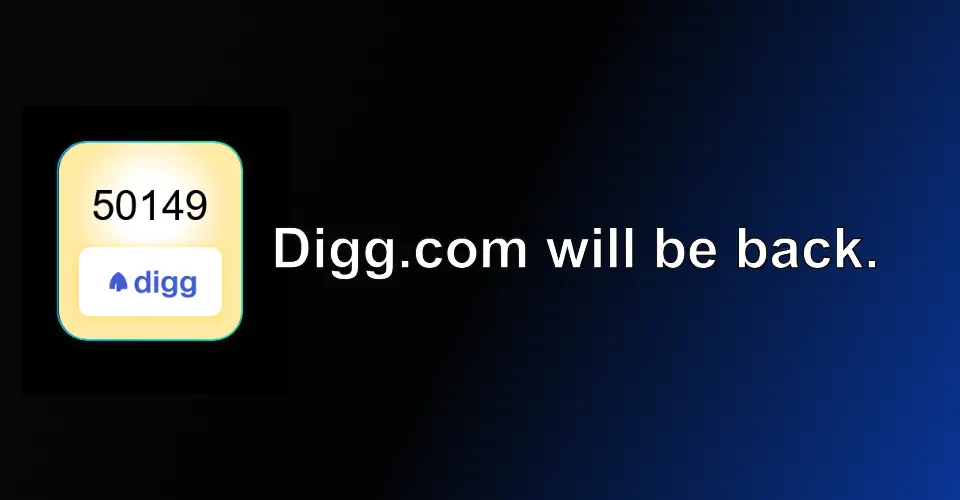Kevin Rose and Alexis Team to bring back Digg.com

In a surprising move, Digg.com - the once-dominant social news platform - is poised for a comeback under the stewardship of its original founder, Kevin Rose, and Reddit co-founder Alexis Ohanian, as New York Times report. The duo recently acquired the platform for an undisclosed sum with a view to relaunching it as a community-focused space that emphasises "connection and humanity". The move has piqued the curiosity of tech enthusiasts and former users alike, raising questions about how a relic of the early social web might adapt to today's fragmented digital landscape. To understand the significance of this revival, it's important to revisit Digg's legacy, the trajectories of its founders, and the potential implications of their vision.
Digg’s Rise and Fall: A Brief History
Founded in 2004 by Kevin Rose, Digg revolutionised the way people discover and share content online. At its peak, the platform allowed users to 'dig' (upvote) or 'bury' (downvote) news stories, blog posts and videos, creating a democratised alternative to traditional media gatekeepers. By 2008, Digg boasted millions of active users and a valuation of nearly $160 million, positioning itself as a cultural force capable of driving traffic to websites with a single algorithmically-boosted headline. But its downfall was swift. A controversial redesign in 2010 alienated core users by prioritising corporate publishers over grassroots content, triggering a mass exodus to competitors such as Reddit. Sold to Betaworks in 2012 for a fraction of its value, and later to BuySellAds in 2018, Digg became a shadow of its former self - a cautionary tale about the fragility of online communities.
Kevin Rose: From Digg’s Architect to Tech Visionary
Kevin Rose’s journey epitomizes Silicon Valley’s blend of ambition and reinvention. After launching Digg in his mid-20s, Rose became a celebrity entrepreneur, gracing magazine covers and hosting tech shows. Yet, following Digg’s decline, he pivoted seamlessly into venture capital, co-funding firms like Google Ventures (now GV) and launching startups such as Milk, a mobile app incubator acquired by Google. His post-Digg career reflects a knack for identifying tech trends, from podcasting (he co-founded the network Revision3) to blockchain (as CEO of Hodinkee). Rose’s decision to reclaim Digg suggests a desire to reconcile his legacy with lessons learned over a decade—a rare opportunity to rewrite history.
Alexis Ohanian: Reddit’s Philosopher and Community Advocate
Alexis Ohanian, often referred to as the "mayor of the internet", brings a complementary perspective. As co-founder of Reddit in 2005, he championed free speech and user autonomy, principles that helped the platform grow into a behemoth with over 50 million daily users. After stepping down from active management in 2020, Ohanian focused on venture capital through Initialized Capital and advocacy, including initiatives for paid family leave and racial justice. His involvement with Digg is intriguing, given Reddit's role in overshadowing it. However, Ohanian's recent critique of the toxicity of social media - calling for 'a kinder, more empathetic internet' - aligns with Digg's proposed focus on humanity, suggesting a shared vision to promote healthier online interactions.
Relaunching Digg: A Vision of Connection in a Divided Digital Age
While specifics remain scarce, Rose and Ohanian have emphasized that the new Digg will prioritize “human-centric” engagement over algorithmic feeds- a deliberate shift from platforms like Facebook or TikTok, which often amplify divisive content. This philosophy echoes early web ideals, where niche forums and blogs thrived on authentic interaction. Potential features could include enhanced moderation tools, community-led curation, or even blockchain-based ownership models, given Rose’s recent interests. The challenge lies in balancing nostalgia with innovation: appealing to former users while attracting generations accustomed to Instagram Stories and Discord servers. Moreover, the pair must address lingering skepticism; after all, Digg’s downfall was rooted in losing users’ trust, a wound not easily healed.
Challenges and Opportunities in a Crowded Market
The relaunch enters a social media ecosystem dominated by giants and niche upstarts alike. Can Digg carve out a niche between Reddit's anarchic forums, Substack's newsletters and Twitter's real-time chatter? Its success may depend on using Rose and Ohanian's community-building expertise to create a space that feels both familiar and revolutionary. Monetisation is another hurdle. While Reddit relies on advertising and premium memberships, Digg could explore partnerships with creators or subscription models - avenues in line with its ethos of valuing quality over virality.
Conclusion: A Second Chance for Digital Utopianism?
The revival of Digg is more than a business venture; it's a symbolic gesture towards reclaiming the Internet's original promise - a space for curiosity, collaboration and genuine connection. Rose and Ohanian, both shaped by the rise and fall of their creations, now have a unique opportunity to combine hindsight with innovation. Whether Digg becomes a thriving hub or a nostalgic experiment depends on their ability to translate idealism into actionable design. In an era of algorithmic fatigue and platform distrust, the world may be ready for a comeback story that prioritises people over profit. As the digital landscape holds its breath, one thing is clear: the stakes for Digg's second act are as much about fixing the broken parts of the web as they are about honouring its past.
» How to Sell Your Shopify Store (2026 Guide)
» 10 Different Types of Founders Who Sell Their Companies